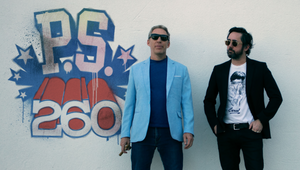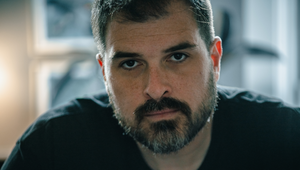
Producing Tomorrow's Producers: Learning from Others with Raná Martin

When she's not working, Raná gets joy from singing, playing trumpet, and career mentoring young talent of color and the LGBTQ+ community.
LBB> What advice would you give to any aspiring producers or content creators hoping to make the jump into production?
Raná> Stay inspired. Time, experience, and repetition will teach you how to do your job. Staying inspired will teach you why you do your job.
The best source of inspiration can be found in those working around you. Stop, listen, and learn from the experiences of others. Exploring new ideas, art forms, and cultures is the best way to stay relevant and will also put you in the best position to be an asset to the creative process and your team when opportunities arise.
LBB> What skills or emerging areas would you advise aspiring producers to learn about and educate themselves about?
Raná> I am a massive fan of editing and all things post production. I’ve been studying and learning from the work of others throughout my career development. I learned that education is an ongoing process for any producer, and there are technological advancements around every corner - especially with post production. Watching the work, staying curious, paying attention to the process, and speaking regularly to artists, assistants, and engineers is a great way to learn.
Due to the constant need for expedience, it can seem easier to go with what you know; however, taking time to ask for thoughts and opinions in the planning phase often teaches you a lot and leads to discoveries and workflows that help your people and your business.
LBB> What was the biggest lesson you learned when you were starting out in production - and why has that stayed with you?
Raná> Communication is key. It is the biggest lesson to set the most vital foundation and the key to success for any project or pursuit.
I'm a "why-type," and I find most people in our field are the same. Providing details and context to your communication also goes a long way to keep everyone informed and provide purpose and clarity. Knowing why something needs to get done is just as important as how it gets done. It establishes accountability and inspires motivation.
LBB> When it comes to broadening access to production and improving diversity and inclusion what are your team doing to address this?
Raná> It has always been a dream for me to see people who look like me "in the room" and "at the table.” I know this is a common dream across all categories of those creatively underrepresented. In the past years, I have seen more inclusion based on initiatives and general interest in showing diverse representation across all media and entertainment; however, there is still more progress to be made.
This topic is of utmost importance to me and our team at PS260. We keep DE&I top of mind with our hiring and training practices, partnerships and collaborations, and engagement with the community. Throughout my career, I have championed for the underserved and worked hard to elevate the voices of those unheard. Working hard to be in the room and at the table is one of the best things I can do to continue broadening that access for others.
LBB> And why is it an important issue for the production community to address?
Raná> Diversity, equity, and inclusion are all crucial issues for the production community to address. While this should be obvious, it is often overlooked and misunderstood. There are many reasons for the importance, including encouraging authenticity in the work and the workplace, fostering creativity and innovation, representing diverse perspectives, discouraging stereotypes and misrepresentation, cultural sensitivity, and future-proofing across generations.
What speaks most to decision-makers is that DE&I initiatives also have a major effect on market relevance and talent pool expansion, and those areas are rarely overlooked when it comes to business development.
We must have honest discussions and continuous dialogue on these issues if we truly want to inspire change.
LBB> There are young people getting into production who maybe don’t see the line between professional production and the creator economy, and that may well also be the shape of things to come. What are your thoughts about that? Is there a tension between more formalised production and the ‘creator economy’ or do the two feed into each other?
Raná> I think professional and user-generated content has had a long history of feeding into each other. This has been developing steadily with prosumer technology from cameras to editing software, and this access has fostered and grown amazing artists across all disciplines.
We see the most prolific example of this synergy from the biggest global brands as they showcase their products through professional production campaigns while showcasing creator content and content creators.
With social media marketing and monetization, as well as a generational shift in viewership from TV screens to devices, we are all sharing this space and thriving together. Not only has the new "creator economy" allowed content creators to take big steps into the professional realm, but it has also given more traditional production professionals the ability to expand and increase their artistic output.
At our core, we are all creators using the tools and mediums that best showcase our talents while serving our target audiences.
LBB> If you compare your role to the role of the heads of TV/heads of production/executive producers when you first joined the industry, what do you think are the most striking or interesting changes (and what surprising things have stayed the same?)
Raná> I was incredibly fortunate to have amazing mentors in my development -- not only at the companies where I worked but also through my client and vendor relationships. I got a front-row seat to see how things work from all perspectives. Something that rings true and will never change is our role and responsibility to nurture the people, the work, and the creative process.
The most obvious change I have seen over the years is how we manage and mentor our teams. We are no longer only working together in one location, in one time zone, or even on one continent. Even before the pandemic, editing and post production services became more and more borderless with each technological advancement while allowing us to broaden our talent pools and client bases globally. As a result, it requires a much more attentive approach to oversight and training. I learned so much from watching and listening to my executive producers and managing directors. Now, I have a more significant responsibility to share my experiences, communicate, and pay attention in a way that no longer happens naturally in a shared workspace or solely from an executive office.
LBB> When it comes to educating producers how does your agency like to approach this? (I know we’re always hearing about how much easier it is to educate or train oneself on tech etc, but what areas do you think producers can benefit from more directed or structured training?)
Raná> The best way to learn is by doing, but it also helps just to watch and listen. That means exposing junior producers to all parts of the process, including them in daily dialogue, and being readily accessible to provide guidance as they take the reins on projects of their own. When I started, my producer education played out much like Karate Kid and “wax on, wax off.” While I entered work orders and chased invoices and itemized expenses, I was ultimately learning about every aspect of the process. We all learn from directed and structured training in some form - whether it be from a manual of instructions or a combination of guidance and job shadowing; however, all projects will deviate from the norm at some point, and that's when it becomes invaluable to pull from all those past observational experiences.
LBB> It seems that there’s an emphasis on speed and volume when it comes to content - but to where is the space for up and coming producers to learn about (and learn to appreciate) craft?
Raná> We are the space. The greatest part about the work we do is the access we have to each other. There are so many sources and platforms available for us to view groundbreaking, engaging, inspiring, and entertaining work; however, the key to learning about and appreciating craft is to discuss it.
I often recall all the incredible discussions I have been honored to have with editors about their approaches and processes to editing over the years, and it has only encouraged me to continue those conversations on a daily basis with each and every editor I work with and meet along the way. This desire to learn spans across all the specializations of production and post production and helps me become a better resource to everyone and every project I support.
LBB> On the other side of the equation, what’s the key to retaining expertise and helping people who have been working in production for decades to develop new skills?
Raná> Creating a continuous learning culture is vital. We should all be encouraged to learn from each other. Those of us working in production for decades may know a great deal, but we don't know it all. There is something new to learn daily. By encouraging others to ask questions, you encourage yourself to do so as well.
LBB> Clearly there is so much change, but what are the personality traits and skills that will always be in demand from producers?
Raná> There are some traits and skills that will never go out of style - strong communication, problem-solving, and time management skills come to mind, as well as showing grace under pressure.
However, I believe being a resource to the creative process is the most invaluable skill for a producer. It goes beyond the basics of project scheduling, coordination, and doing math. What ideas and solutions are you bringing to the table? What relationships are you nurturing outside of your immediate work environment so you can pick up the phone and get other artists involved? How can you best educate yourself on workflows to help others be more productive and efficient? There are so many contributions to be made as a producer outside of what is generally expected of the role. Understanding and embracing that will always be in demand.















